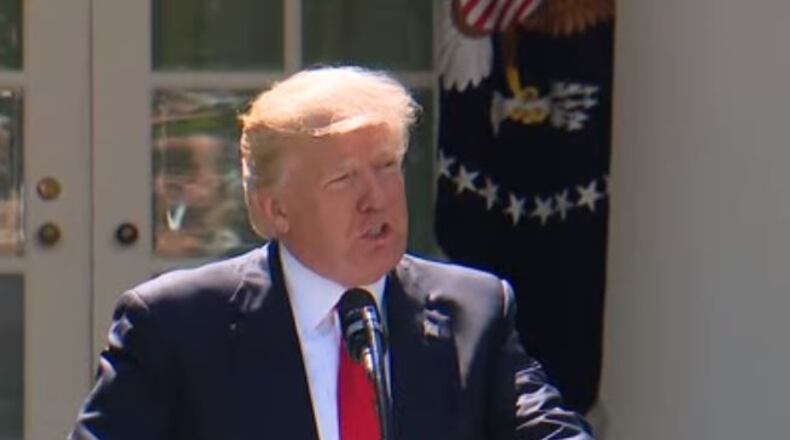Critics of President Donald Trump seized on his decision Thursday to withdraw the United States from the Paris climate change accord, labeling it a short-sighted move in terms of the environment, with some predicting it would end up giving Democrats the chance to win back Congress in 2018 and the White House in 2020.
But how much does the President's decision really change the political dynamic? If his base strongly supports him, is it really an overall negative?
Let's take a look.
1. Democrats get energized about Trump. Again. Since America got up the morning after the November elections, Democrats have felt much more energized politically, and climate change is certainly something that has long been an issue that has trended more to that side of the political aisle. "A historic mistake," said Sen. Mark Warner (D-VA) of Mr. Trump's decision on the Paris agreement. "Trump's withdrawal from Paris Accord is a monumentally stupid act," said Rep. Jared Huffman (D-CA). Senate Democratic Leader Charles Schumer sent out a fake newspaper that evoked a famous New York Daily News headline - "Trump to World: Drop Dead" - as Democrats revved up their social media attacks on the GOP:
2. No panic among Republicans over Trump move. Yes, there were a few Republicans - mainly from Florida and other coastal regions, who voiced concern about the Trump move, but for the most part, GOP lawmakers in Congress stuck with the President. "President Trump did the right thing by withdrawing us from Paris treaty," tweeted Rep. Jim Jordan (R-OH). Sen. David Perdue (R-GA) labeled the Paris deal a "perfect example of Obama-era overreach." "I appreciate the president's desire to renegotiate an agreement that is more in line with what is achievable," said Sen. Bob Corker (R-TN). For the GOP, this is less about climate, and more about excessive regulations and a government doing too much.
3. But the polls say there's strong support for Paris. Yes, the polls do show that. But I can also show you an election not long ago where the party that is the strong supporter of that Paris agreement didn't exactly win the House, Senate or White House. I went back a few years to look at some polling, and this 2014 poll from Gallup bears out what I see in the Congress: "Politics remain a powerful predictor of Americans' worries about global warming, with more than half of Democrats saying they worry about it a great deal, compared with 29% of independents and 16% of Republicans." Remember, President Obama could have brought the Paris deal before the Senate for a vote. But it would have been soundly defeated, and the same would happen today.
4. Let's explain why this might help Democrats. As mentioned above, climate change is one more issue that motivates opponents of President Trump, as Democrats hope to win back Congress in 2018 and win back the White House in 2020. Democrats think differences over climate will do best for them in suburban areas, where feelings on global warming trend a little more toward Team Blue than Team Red. "Trump has just elevated "the environment" as a political issue in 2018 and 2020," said political analyst Stu Rothenberg. "And that definitely is not to his or the GOP's advantage."
5. Let's explain why this might help Republicans. There aren't many issues that would be more enticing to GOP candidates than to peg Democrats as a bunch of wild-eyed, liberal tree-huggers, who want to take your SUV away and tax you to death to pay for solar and wind energy. 20 years ago, the target was the same, but the GOP simply used the label, "radical environmentalists." I wouldn't go so far as to say this is a net positive for Trump - but to many in his base, this is a home run. Trump used his speech to make a play for voters, mentioning Pittsburgh, Youngstown, Ohio and Detroit. He won in November in Pennsylvania, Ohio and Michigan, capitalizing on a message that resonated with working class white voters in the Rust Belt - a formula he has used on trade as well.
Stay tuned.
About the Author


